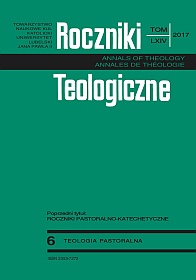Models of Salvific Activity of the Church. The State of Research and Future Perspectives
Abstrakt
The main objective of pastoral theologians is to develop theologically accurate and practically effective models of salvific activity of the Church, known as pastoral care. A pastoral model is a simplified, descriptive, graphical reflection of the whole or a part of the complex salvific activity of the Church, embracing both a normative and practical element of the activity, which makes it possible to analyze and evaluate it, as well as to offer some predictions for the future (N. Hepp). The aim of this article is to present the state of research concerning the current models of salvific activity of the Church within the scope of pastoral theology and to direct us towards a need to develop new models that will take the socio-cultural context into account. Nowadays, we can talk of three such models that have been scientifically discussed on a global scale (the human-divine model by F. X. Arnold, the community model by F. Klostermann, and the preferential option for the poor). It seems, then, that there is a space for a new model of salvific activity of the Church, centered on the principle of love, or alternatively, the model of dialogue.
Bibliografia
Arnold, Franz Xaver. Grundsätzliches und Geschichtliches zur Theologie der Seelsorge. Das Prinzip des Gott-menschlichen. Freiburg: Herder, 1949.
Arnold, Franz Xaver. Pastoraltheologische Durchblicke. Das Prinzip des Gott-Menschlichen und der Geschichtliche Weg der Pastoraltheologie. Freiburg: Herder, 1965.
Blachnicki, Franciszek. Teologia pastoralna ogólna, vol. 1: Wstęp do teologii pastoralnej. Teologiczne zasady duszpasterstwa. Lublin: Mała Poligrafia KUL, 1970.
Blachnicki, Franciszek. Teologia pastoralna ogólna, vol. 2: Eklezjologiczna dedukcja teologii pastoralnej. Lublin: Mała Poligrafia KUL, 1971.
Hepp, Normann. “Modelle, pastorale.” In Handbuch der Pastoraltheologie. Praktische Theologie der Kirche in ihrer Gegenwart, vol. 5, edited by Franz Xaver Arnold, Karl Rahner, Viktor Schurr, Leonhard M. Weber and Ferdinand Klostermann, 336-8. Freiburg–Basel–Wien: Herder, 1972.
Kamiński, Ryszard. “Teologia pastoralna w okresie posoborowym.” In Teologia pastoralna, vol. 1, edited by Ryszard Kamiński, 83-100. Lublin: Atla 2, 2000.
Klostermann, Ferdinand. Prinzip Gemeinde. Gemeinde als Prinzip des Kirchlichen Lebens und der Pastoraltheologie als der Theologie dieses Lebens. Wien: Herder, 1965.
Przybecki, Adam. “Pojęcie modelu duszpasterstwa w teologii pastoralnej.” Teologia Praktyczna 9(2008): 127-35.
Przygoda, Wiesław. “Armut als Pastorales Prinzip nach Papst Franziskus.” In Papst Franciskus. Ermutigung und Herausforderung für Theologie und Pastoral in Mittel- und Osteuropa, vol. 8 of Pastoraltheologische Hefte, edited by Mieczysław Polak, Teresa Kowalczyk, and Petr Slouk, 58-71. Gniezno–Wien: Gaudentinum, 2015.
Przygoda, Wiesław. “Miłosierdzie drogą człowieka do Boga. Teologiczna antropologia 50 lat po ogłoszeniu ‘Gaudium et Spes’.” Roczniki Teologiczne 63(2016), 6: 35-50.
Przygoda, Wiesław. “Model pastoralny.” In Leksykon teologii pastoralnej, edited by Ryszard Kamiński, Wiesław Przygoda, and Marek Fiałkowski, 515-6. Lublin: TN KUL, 2006.
Przygoda, Wiesław. “Opcja preferencyjna na rzecz ubogich według ‘Evangelii Gaudium’.” In: Kościół wobec wyzwań współczesnych, edited by Marek Jagodziński and Jarosław Wojtkun, 197-214. Radom: Ave, 2015.
Copyright (c) 2017 Roczniki Teologiczne

Utwór dostępny jest na licencji Creative Commons Uznanie autorstwa – Użycie niekomercyjne – Bez utworów zależnych 4.0 Międzynarodowe.





